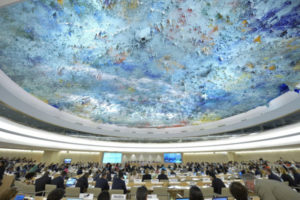The Human Right Council has adopted two resolutions proposed by the European Union and a group of African Countries. Both commissions affirm crimes are being committed in Burundi, says a human rights activist.

The United Nations Human Rights Council meeting in Geneva to consider the report of the Commission of Enquiry into Burundi
The UN Human Rights Council adopted on 29 September the resolution proposed by the European Union to extend for one year the mandate of the Commission of Enquiry into Burundi. This decision comes when on 28 September, the same council adopted a resolution on Burundi presented by the African countries .It consisted of dispatching urgently three experts to collaborate with Burundian authorities and all other stakeholders in particular the United Nations agencies in order to get information on human rights violations in Burundi. This information will be forwarded to judicial authorities of Burundi in order to establish the truth and ensure that perpetrators of deplorable crimes are brought before Burundi judicial authorities, according to African resolution.
The UN Independent Commission of Enquiry into Burundi presented its final report before the Human Rights Council on 19 September in Geneva during the 36th session. The commission accused Burundian authorities of crimes against humanity and called on International Criminal Court (ICC) to open immediately investigation into Burundi.
The Government of Burundi rejected the commission’s report accusing it of being partial. “Burundi publicly and completely rejects the report and asks for its invalidity,” said Rénovat Tabou, Representative of Burundi to the Human Right Council during the 36th session.
The Commission of Enquiry into Burundi was created by Human Rights Council resolution 33/24, adopted on 30 September 2016, to conduct a thorough investigation into human rights violations and abuses committed in Burundi since April 2015, determine whether any of them may constitute international crimes and identify their alleged perpetrators.
Burundi will never collaborate with the UN commission of enquiry
“The government of Burundi rejects any project of extending the mandate of the commission of enquiry into Burundi,” said Martin Nivyabandi, Minister of Human Rights, in a press conference on 28 September.
Nivyabandi said the Human Right Council is being politicized. “We strongly reject the commission’s report. We realize that there is a hidden agenda behind this commission. We will never collaborate with its members,” said Nivyabandi.
Lambert Nigarura, a human rights activist, says the resolution proposed by the African group and the one proposed by the European Union affirm that crimes against humanity are being committed in Burundi. “For us, this is a big step. We do not doubt that the International Criminal Court will be able to prosecute perpetrators of crimes,” says Nigarura, adding that those commissions would face collaboration related problems.
For him, the three experts proposed by the African group will present their report to the Office of the High Commissioner for Human Rights while the Commission of Enquiry will present its report to the Human Rights Council. The perpetrators of the crimes that will be identified by the three experts will be judged by the Burundian judiciary.
On 26 October 2016, Burundi announced its decision to withdraw from the Rome Statute. The withdrawal will take effect on 27 October.



















 IWACU Open Data
IWACU Open Data

